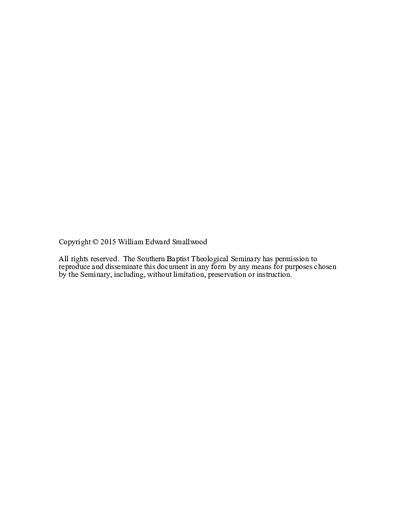"The Most Versatile Man": The Life, Ministry, and Piety of Basil Manly Jr.
Subject
Manly, Basil, 1825-1892--InfluenceSouthern Baptist Convention--History
Spirituality--Baptists
Abstract
This dissertation argues that the life and ministry of Basil Manly Jr. had remarkable impact on the spiritual lives of Southern Baptists. His ability to transform people through the diversity of his labors, which he personally felt were too broad, continues to exert meaningful sway upon his denomination, and more broadly, American evangelicalism. Manly must be remembered as a central figure in the establishment, shaping, and preservation of many of the enduring institutions of the Southern Baptist Convention—Sunday school, hymnody, and theological education—all while not compromising historic, orthodox beliefs of the church. By reviewing his primary sources, this dissertation develops a cohesive understanding of the themes and practice of piety demonstrated in the life and thought of Manly.
The introduction explains the importance of Manly’s life, ministry, and piety in light of his influence within the Southern Baptist Convention. Chapter 2 analyzes the impact of the teaching and preaching of his father and the spiritual tradition that became known as the Charleston tradition with its emphasis on Calvinistic theology, orderly worship, and, most significantly in Manly’s life, an educated and professional clergy. Chapter 3 studies the influences upon Manly in the development of his piety during his theological education at two Northern institutions.
Chapter 4 discusses the role of Manly played in the establishment of a Sunday school in every Baptist church for the conversion and spiritual growth of all but especially children and young people. Chapter 5 explores Manly’s work as not only a hymn writer but also an editor and compiler of hymns. The hymns written, tunes composed, and the hymnals edited by Manly are marks of a rich spirituality of worship.
Chapter 6 examines Manly’s view of Scripture, chiefly his understanding of the doctrine of inspiration. Chapter 7, the conclusion, discusses the long-term impact of Manly not only on the Southern Baptist Convention but several Southern Baptist institutions. Manly’s piety, grounded firmly in and fashioned by Scripture, was instrumental in shaping the piety of future generations of Southern Baptists.

